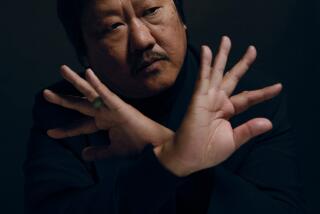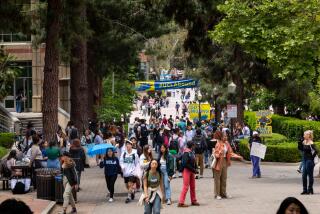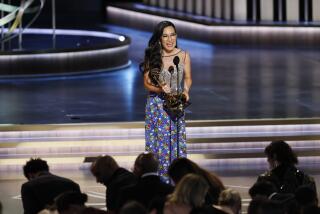Chemistry Prodigy in His Element in Research Project
- Share via
While most of his high school classmates were either lying on the beach or working last summer, 17-year-old Kelvin Wong was in a science lab at California State University, Los Angeles, doing the type of research even a college chemistry student might find difficult.
But the South Pasadena High School senior is not an average student.
Wong spent more than 400 hours in the lab last summer working to better understand a component of a tranquilizer used to treat schizophrenics. He placed part of a molecule in different chemical solutions to analyze changes in its shape. His ultimate aim is to determine how the different shapes affect the tranquilizer.
Judges for the 45th Westinghouse Science Talent Search were so impressed with the research that Wong has advanced to the finals of the national competition. During the next five days, he will be in Washington competing with 39 other high school students from around the country for $140,000 in scholarships.
The research has already brought him recognition. He won first place in the senior chemistry division of the 35th Los Angeles County Science Fair last year and then received a grant from the National Institutes of Health to continue his work.
Unlike most high school students, Wong has also taken an upper-division university chemistry class.
He got a rare perfect score of 800 on the mathematics section of the Scholastic Aptitude Test, an exam administered nationwide to test mathematics and language skills of college applicants.
“In my eight years here at South Pasadena, he has had the most curious and scientific mind of any student,” said biology teacher Greg Ring.
His scientific bent goes back to “when he was little,” said Dinah Wong, Kelvin’s mother. “Every time I took him to buy a toy he liked something
with machinery . . . so later he started getting more interested in science.”
Recalling that as a child he liked to play with toy chemistry sets, Kelvin said, “Ever since I can remember I was doing experiments on my own.”
But Ring said that although Wong devotes a lot of his time to scientific pursuits he has other interests.
Wong’s mother agrees. “He is interested in many things and I don’t feel he spends very much time on any one thing,” she said.
Take last summer for example. Wong would spend up to 11 hours a day on his research. But in August, he left for China where he spent a month practicing wu-shu, a martial art similar to kung fu, but without the fighting component. He has studied it for five years.
Father Born in China
Since his father, Jin Wong, an electrical engineer, was born in China and his mother’s parents are Chinese, the trip was also a return to the land of his ancestors.
“I got to visit a castle that was a thousand years old and there were steps with holes in them where people had walked. You don’t get to see things like that in the U. S.,” Wong said.
“I speak Mandarin and that helped . . . . It was a broadening experience in that I lived by myself. I matured a lot,” Wong said.
He ended the trip with a solo wu-shu demonstration at a gymnastics-type meet in Shanghai before returning to South Pasadena.
Wong began working with the the tranquilizer in 1984, when he first enrolled in a chemistry class at Cal State L. A., through a program that allows high school students to take a college class on the campus.
Too Minute for the Eye
Because the material he works with is too minute to be seen by the eye, Wong used a nuclear magnetic resonance spectroscope, a machine that provides data on the shape of the part of the molecule he is studying.
“I have a lot more work left to make it a tangible effect on the treatment of schizophrenics, but I looked at a side chain of the molecule separately and no one has done that before,” Wong said.
Westinghouse has guaranteed Wong at least $1,000 and he will compete for 10 scholarships ranging from $7,000 to $20,000.
Kit Newton, a spokesman for Westinghouse, said 1,219 entries were received from 561 high schools and were judged on who did “the best independent research that’s been done on the high school level.”
Westinghouse named 300 of the students, including Wong, to its 1986 honors group and chose 40 finalists from that group to compete for the scholarships. Three of the finalists are from California, including Wong and Andrew Lawrence Feig from University High School in West Los Angeles.
Wrote an Essay
As part of the competition, Wong submitted a written summary of his research and wrote an essay about himself that included information on his future plans and participation in high school extracurricular activities, such as the debate team.
“In many cases these students are smarter than their teachers and one of the most valuable parts of the trip (to Washington) is they get to meet with other students who are their scientific peers,” Newton said.
During the trip, Wong will meet with a representative of one of California’s two senators and he will spend a day at the National Institutes of Health, the same agency that gave him the grant.
“We got a choice of where we wanted to go, including agencies like NASA,” Wong said, “but I want to meet with someone who works in the National Cancer Institute (one of the agencies included in the National Institutes of Health).
“Some of the other choices are more accessible (and) going to the cancer institute is not an opportunity you normally get.”
Interviews Planned
In Washington, Wong will be interviewed by a panel of eight scientists from around the country who will question him about his research.
“Many of the questions may be unanswerable, but they (the judges) are trying to gauge how the students think,” Newton said.
“I am preparing a (display) board and will present the results with pictures and tables,” Wong said.
Dr. Phoebe Dea, a Cal State chemistry professor, has overseen Wong’s research since he enrolled in the upper-division chemistry class at Cal State. “The chemistry class Kelvin chose is usually for students who have more experience, but Kelvin is rather special,” said Dea, who Wong said has been most influential in the development of his scientific pursuits.
Wong became interested in the tranquilizer in August, 1984, when Dea, who had done research on the tranquilizer, suggested that Wong begin looking into it. Although he originally was interested in various chemical compounds, he chose the tranquilizer because it interested him more than others.
Although Wong’s summer research was intended to confirm previous conclusions, Dea said he acquired a better understanding of the technical aspects of the research.
Understood Readings
“Before the summer he had problems understanding the literature he had to read for his project, but after the summer he understood the readings,” Dea said.
South Pasadena High’s Ring, who said Wong is functioning at a college level, added, “He is very eloquent at describing his science project because he has a firm grasp on his research.”
Ring teaches advanced placement biology, a class for which students can get college credit if they score high enough on a test given by the College Board, a company based in New York that administers advanced placement tests nationwide.
“Getting a 5 (the highest possible score) on the advanced placement biology was a real feather in his cap,” Ring said, especially since Wong was one of only two juniors who took the class last year. Ring said that of the approximately 20 students in the class each year, very few get a 5.
A-minus Average
Wong has also taken advanced-placement classes in U. S. history, English, calculus, chemistry and physics and has managed to maintain an A-minus average even with the heavy workload.
Wong has already been accepted by the University of California, Berkeley, and is waiting to hear from a variety of other schools, including Massachusetts Institute of Technology, Harvard, Caltech and Princeton.
“What do I want out of life? Happiness,” Wong said. “I would get happiness from doing research in chemistry and teaching at the university level.”
Ten years down the road “I can really see him getting into biochemical research,” Ring said. “Right now I think he has a very good chance of winning a large scholarship from Westinghouse.”
More to Read
Sign up for Essential California
The most important California stories and recommendations in your inbox every morning.
You may occasionally receive promotional content from the Los Angeles Times.













